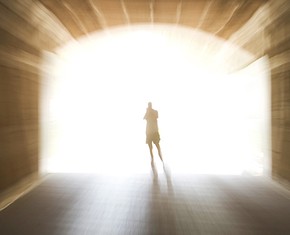The views expressed in our content reflect individual perspectives and do not represent the authoritative views of the Baha'i Faith.
The other day, while grocery shopping, someone else’s child had a total meltdown on the floor right in front of my shopping cart. He put on quite a show.
Here’s what I saw: the child, a cute little boy of about four or five, wanted a box of Cocoa Puffs cereal. His mother said no. “Pure sugar for breakfast?” she said, “I don’t think so, honey. That wouldn’t be good for you.” The boy pleaded and begged. She smiled and shook her head. He began to cry. Then he started to scream, at the highest volume his tiny lungs could produce—which filled the entire store. His mother tried to quiet him, to no avail. He threw himself to the floor and thrashed around as though in physical torment, screaming at high volume, knocking cereal boxes off the shelves, making his anger and unhappiness clear to everyone.
Suddenly, while trying to block out the incredible noise that decompensating child made, my mind saw him forty years in the future, as a political leader or a general whose irrational anger was leading an entire nation to war.
Adults have tantrums, too, you know—but when we put them in charge of millions of people, their meltdowns create much more damage.
Anyway, my sudden unexpected vision had me reflecting, all day long and into the night, on the nature of human rationality.
We’re rational beings, sure—but we all have powerful irrational, emotional impulses, too, as the cereal boy’s tantrum amply demonstrated. If we survive our own childhood meltdowns and grow into mature, sensible adults, we learn to mindfully and rationally evaluate the facts of a situation and overrule those impulses. But no one ever escapes them entirely—if you want proof, just read a newspaper or watch the news. You’ll see alleged grown-ups acting in completely irrational ways every day, ways guaranteed to hurt themselves or others.
That’s why we need the foundational institutions of human civilization—governments, the rule of law and religious systems—to help us act in rational ways that don’t harm anyone. Without those civilizing institutions, humanity could descend back into chaos and tribal barbarism. A recent interview in the New York Times with Harvard scientist and renowned author Steven Pinker reminded me of this fact. The interviewer asked him “So, we need institutions like government to keep us acting rationally?” Pinker responded:
None of us is anywhere close to perfect. Scientists themselves are not terribly, not completely rational. We can set up institutions that result in greater rationality than any of us is capable of individually, like peer review, like free speech, like a free press, like empirical testing—norms and institutions that make us collectively more rational than any of us is individually. – Dr. Steven Pinker, in an interview with Karen Weintraub, “Steven Pinker Thinks the Future Is Looking Bright: The Harvard psychologist says he is no starry-eyed optimist. It’s just that the data don’t lie,” The New York Times, November 19, 2018.
After reading that thought-provoking interview and Dr. Pinker’s latest book Enlightenment Now, I started contemplating the human rational faculty, and I found this astonishing passage from Baha’u’llah in the Baha’i writings:
Consider the rational faculty with which God hath endowed the essence of man. Examine thine own self, and behold how thy motion and stillness, thy will and purpose, thy sight and hearing, thy sense of smell and power of speech, and whatever else is related to, or transcendeth, thy physical senses or spiritual perceptions, all proceed from, and owe their existence to, this same faculty. So closely are they related unto it, that if in less than the twinkling of an eye its relationship to the human body be severed, each and every one of these senses will cease immediately to exercise its function, and will be deprived of the power to manifest the evidences of its activity. It is indubitably clear and evident that each of these afore-mentioned instruments has depended, and will ever continue to depend, for its proper functioning on this rational faculty, which should be regarded as a sign of the revelation of Him Who is the sovereign Lord of all. Through its manifestation all these names and attributes have been revealed, and by the suspension of its action they are all destroyed and perish. …
Wert thou to ponder in thine heart, from now until the end that hath no end, and with all the concentrated intelligence and understanding which the greatest minds have attained in the past or will attain in the future, this divinely ordained and subtle Reality, this sign of the revelation of the All-Abiding, All-Glorious God, thou wilt fail to comprehend its mystery or to appraise its virtue. Having recognized thy powerlessness to attain to an adequate understanding of that Reality which abideth within thee, thou wilt readily admit the futility of such efforts as may be attempted by thee, or by any of the created things, to fathom the mystery of the Living God, the Day Star of unfading glory, the Ancient of everlasting days. This confession of helplessness which mature contemplation must eventually impel every mind to make is in itself the acme of human understanding, and marketh the culmination of man’s development. – Baha’u’llah, Gleanings from the Writings of Baha’u’llah, pp. 164-166.
“Consider the rational faculty,” Baha’u’llah suggests, and then “… admit the futility of such efforts … to fathom the mystery …”
Our rational faculty—our uniquely human ability to apply logic, higher-level thinking and moral judgment to our motivations and actions—transcends the senses. It powers our consciousness, defines our human reality and illumines our souls, even though we have no way of fully comprehending or understanding it. The ability to act rationally defines us as human.
Abdu’l-Baha put it this way: “Man has a sacred power beyond the confines of the senses. The power of the rational mind is the power of the soul over the senses.” – Divine Philosophy, p. 95.
We all have this remarkable inner reality, this rational soul. The Baha’i teachings ask us to use it for our own benefit and the benefit of humanity.
















Comments
Sign in or create an account
Continue with Googleor